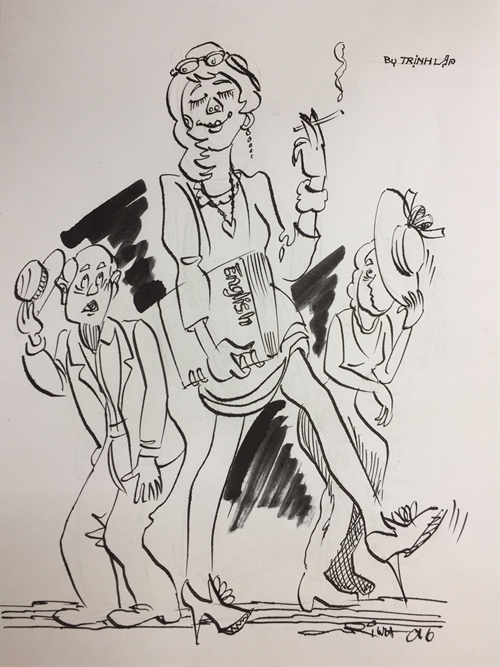 Talk Around Town
Talk Around Town

With Vietnam integrating more deeply into the world, English has become increasingly important, perhaps even a decisive factor in one’s successful future.
 |
by Mộc Miên
Over the past two decades, since Việt Nam and the US normalized their diplomatic relations and the Law on Foreign Investment was issued, waves of foreign investment, especially from English-speaking countries, have flooded the country. It has resulted in many employment opportunities, enormous economic, information, and cultural exchanges, changing the life of every Vietnamese citizen. With Việt Nam integrating more deeply into the world, English has become increasingly important, perhaps even a decisive factor in one’s successful future.
“The use of English is no longer rare in this society. As for recruitment, many enterprises require candidates to use English properly. Regarding work promotion, English abilities are among top priority criteria. It is happening everywhere in the private sector,” says Nguyễn Thùy Linh, a personnel manager.
“My major was engineering at university. I studied it in Vietnamese totally. If I hadn’t trained in English on my own, I would probably not have obtained a high-paying job,” says Trần Anh Tuấn, a graduate student.
Let’s consider how students are studying English. Every day they are sent to an English training center in the hope of mastering the language as much as possible, in addition to increased English learning at school.
“My son has to study at least one foreign language because his future largely depends on how much he can be fluent in foreign languages. I don’t want him to be left behind, receive few chances to approach better education, and then better jobs. He must master English before Japanese or Chinese,” says Ngô Hùng Trí, father of a fourth grader.
The preference for English doesn’t seem linked only to dreams of higher paying jobs. It has become an unimaginable source of social bias. After the finale of the Miss Việt Nam contest in mid-August, the winner, Đỗ Mỹ Linh, received many harsh comments on her English ability after she posted a short English-speaking video on skincare. Some complimented her fluency. But others said her accent was unlike that of a native English speaker and her style was not professional enough. Some even expressed anger that she had been awarded her crown because the runner-up seemed to speak English better. They said she is not qualified to represent Vietnamese beauty in international contests.
Such reactions reflect a social prejudice held by many in Việt Nam, who judge others according to their foreign language fluency.
“Maybe they think that acquiring a new language needs will, hard work, industriousness and commitment. With this assumption, they give themselves a right to judge anyone. On a deeper layer, it says to us that when something becomes popular in society, it will easily be a reference to evaluate any person,” says Nguyễn Kim Phương, a middle-aged life insurance consultant.
I would hesitate to talk about Miss Vietnam 2016 or anyone according to their ability to use English. For me, language is first and foremost a tool for people from different countries to communicate with each other, understand each other and live harmoniously. Speaking English like a native is not essential. Those who do may not be able to communicate effectively with an Indian or Korean who speaks English as a second language.
“We are approaching foreign languages as a tool to promote economic benefits rather than a tool to discover new cultures. Please remember that any language is worthwhile and unique. It would be unfair to judge anyone for their inability to use English as we expect. He or she may be a master of local culture,” says Nguyễn Quỳnh Anh, a high school literature teacher.
Recently, the Ministry of Education decided to develop a roadmap to turn English into the second language of Việt Nam. I myself expect a lot from this initiative - that new generations will be able to confidently communicate with the rest of the world. And I do hope that those involved in the task will find a way to make language a tool to communicate rather than a criterion of people’s worth. VNS




